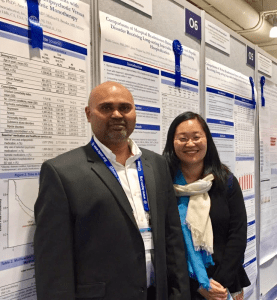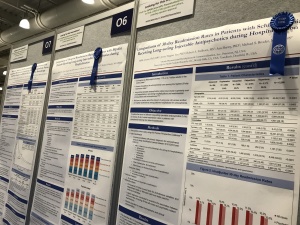Three studies conducted by teams at PHAR were presented at the AMCP Managed Care & Specialty Pharmacy Annual Meeting in San Diego. One study done in partnership with AstraZeneca illustrated how value framework tools designed by ASCO, ICER, and NCCN can be used in a real-world setting by physicians, pharmacists, and health services researchers to systematically assess therapy value in oncology. The two studies done in partnership with Otsuka Pharmaceuticals Development & Commercialization, Inc. and H. Lundbeck A/S focused on the impact of different antipsychotics on medical costs in patients with schizophrenia. The posters can be accessed on the PHAR website.
News
PHAR Publishes New Research on Costs in Relapsed Diffuse Large B-Cell Lymphoma
A real-world study of lymphoma costs conducted by PHAR in conjunction with Kite, a Gilead Company, was recently published in The Oncologist. This study identified multiple important drivers of cost in the understudied population of patients with diffuse large B-cell lymphoma (DLBCL) receiving second-line treatment, such as hematopoietic stem cell transplant (HSCT) and chemotherapy. Even though HSCT is currently the only curative therapy for DLBCL, less than one third of patients receiving second-line and subsequent treatment underwent transplant, which indicates potential underuse. The variation in chemotherapy regimens suggested a lack of consensus for best practices. The full text of the article, as well as a related poster, can be accessed on the PHAR website.
PHAR Publishes New Research on Healthcare Resource Utilization and Costs in Depression and Bipolar Disorder
Two real-world studies completed by PHAR in partnership with Otsuka Pharmaceuticals Development & Commercialization, Inc. and H. Lundbeck A/S were recently published in Advances in Therapy and the Journal of Medical Economics. Together the studies highlight potential treatment options that may reduce healthcare costs in patients with chronic mental illness. The Advances in Therapy article focused on the association between timing of augmentation of antidepressants (ADs) with antipsychotics (APs) and healthcare costs in patients with major depressive disorder. Adding an AP earlier in patients who had inadequately responded to first-line ADs reduces overall healthcare costs. The Journal of Medical Economics article examined medication adherence to oral atypical APs and the impact on psychiatric-related hospitalizations and associated costs in patients with bipolar I disorder (BD-I). Better medication adherence to oral atypical APs was associated with fewer psychiatric-related hospitalizations and lower costs in patients with BD-I. The full text of both articles, as well as related posters, can be accessed on the PHAR website.
PHAR Study Wins Best Poster Award at ISPOR Asia Pacific 2018
Research focusing on schizophrenia, major depressive disorder, and bipolar I disorder conducted by PHAR and supported by Otsuka Pharmaceuticals Development & Commercialization, Inc. and H. Lundbeck A/S was well-represented at ISPOR Asia Pacific 2018. One study focusing on the effect of timing of long-acting injectable initiation in patients with schizophrenia was selected as an oral presentation, and four others were presented as posters. A study on the impact of comorbid substance abuse on costs in bipolar I disorder won the Best Poster General Research Presentation. The posters and related manuscripts can be accessed on the PHAR website.
PHAR Publishes New Findings on Healthcare Resource Utilization and Costs in AL Amyloidosis
A study done by PHAR in partnership with Prothena Biosciences Inc., was recently published in the Journal of Comparative Effectiveness Research. The study estimated the healthcare utilization and costs in amyloid light-chain (AL) amyloidosis. The authors identified AL amyloidosis patients in claims data from 2007 to 2015 and reported inpatient hospitalizations, emergency department visits, non-ED outpatient service visits, and pharmacy utilization. The study found that the general prescribing practices changed over time, with the use of bortezomib increasing and the use of melphalan decreasing. Healthcare utilization and costs decreased between the first and second year after diagnosis. The full text of the study can be read here.
New Studies Conducted by PHAR Presented at ISPOR 2018
At the International Society for Pharmacoeconomics and Outcomes Research (ISPOR) Symposium, two of PHAR’s newest studies were presented. One study done in partnership with Akcea Therapeutics estimated helathcare utilization and cost among patients with hereditary transtheyretin amyloidosis (hATTR) by analyzing insurance claims. Another study, in partnership with Otsuka Pharmaceutical, examined the effectiveness of long-acting injectables in reducing psychiatric hospitalization among patients with bipolar I disorder.
PHAR’s Secondary Data Analysis Team Presents Multiple Studies at AMCP 2018
Three studies conducted by the secondary data analysis team at PHAR were presented at the AMCP Managed Care & Specialty Pharmacy Annual Meeting held in Boston, MA. The studies focused on different disease areas and outcomes, with one study on the health care utilization and costs of newly diagnosed AL amyloidosis, another study on adherence to atypical antipsychotics among patients with bipolar disorder, and another on the disease burden of hereditary transthyretin amyloidosis. All studies were well-received at AMCP 2018, and the posters can be viewed on the PHAR website here.
PHAR Makes 15 Research Presentations at Conferences Across the US in May
PHAR had 14 posters and 1 oral presentation at a series of recent conferences, including the ISPOR 22nd Annual International Meeting, National Lipid Association Scientific Sessions, American Thoracic Society International Conference, and the Annual Meeting of the American Psychiatric Association. Four posters at ISPOR were honored with the Research Poster Finalist Award. The study topics covered a wide variety of conditions and study methods, including using insurance claims to evaluate medication adherence in bipolar patients and developing models to project cardiovascular disease mortality rates. All posters gained favorable reviews at the conferences and can be accessed here.
Biased Estimates of New Drug Costs Miss by Billions
PHAR announced today the final results of a study, published in Current Medical Research and Opinion, which found that pre-launch predictions of the budget impact of newly developed drugs tended to be considerable overestimates of their actual sales. The study examined the accuracy of 25 publicly released predictions for the cost of drugs launched in a variety of indications since 2012. Overall, the predicted budget impact was 5.5 times the actual budget impact of the drug. Ten estimates were off by more than $1 billion: 8 overestimated drug sales by more than a billion; and 2 underestimated it by at least that amount. Overestimating budget impact may lead to early access restrictions, higher copays, and other changes that ultimately impact patients. More information about the study is available here and the detailed results can be viewed here.
PHAR’s Research Presented at CHEST 2016
Research focused on idiopathic pulmonary fibrosis (IPF) conducted by PHAR and supported by Genentech, Inc. was well-represented at the CHEST Annual Meeting 2016. One study was selected as an oral presentation and two were presented as posters. The oral presentation reported on the prevalence of comorbidities in Medicare IPF patients versus disease free controls, and whether it increased over time. The posters presented analyses of mortality, and cardiovascular burden and medication use among IPF patients. The posters can be accessed on the PHAR website here.

